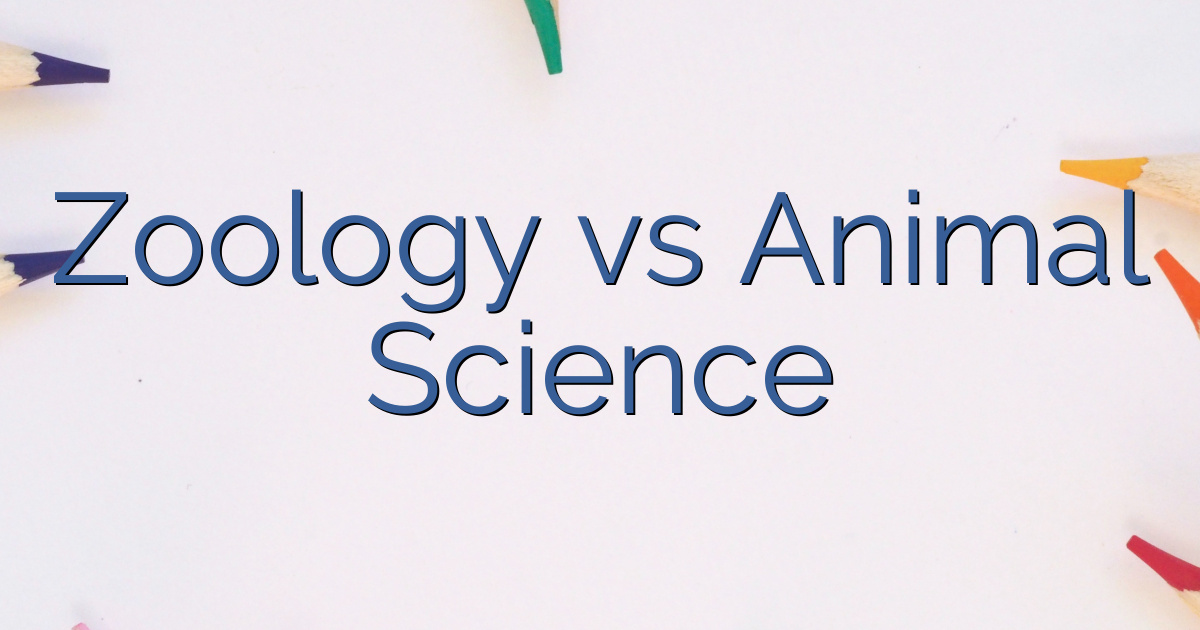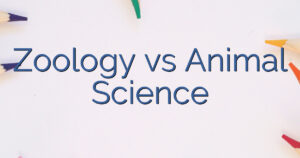
Did you know that zoology and animal science are two distinct fields of study with unique focuses and career paths? In this article, we will explore the similarities and differences between these majors, helping you make an informed decision about your academic and professional future.
By examining the curriculum, skills developed, career opportunities, and salary potential, you will gain a deeper understanding of which path aligns best with your interests and goals.
So, let’s dive in and discover the fascinating world of zoology versus animal science.
Table of Contents
Key Takeaways – Zoology vs Animal Science
- Zoology focuses on animal biology, ecology, and evolution, while Animal Science focuses on the practical application of scientific knowledge in animal agriculture.
- Zoology graduates can work in research institutions, zoos, and conservation organizations, while Animal Science graduates have career opportunities in livestock production and animal health.
- Zoology emphasizes fieldwork and studying animals in their natural habitats, while Animal Science emphasizes laboratory work and controlled environments.
- Both Zoology and Animal Science majors value internships and practical experience to gain hands-on skills in their respective fields.
Overview of the two majors: Zoology and Animal Science
Zoology and Animal Science are two majors that offer a comprehensive understanding of animals and their behaviors. When it comes to curriculum differences, Zoology focuses more on the study of animal biology, ecology, and evolution. It delves into the anatomical, physiological, and genetic aspects of animals.
On the other hand, Animal Science focuses on the practical application of scientific knowledge in animal agriculture and production. It covers areas like animal nutrition, breeding, and management.
In terms of job prospects, Zoology graduates can find work in research institutions, zoos, wildlife management, and conservation organizations. Animal Science graduates, on the other hand, have career opportunities in livestock production, animal health, and food processing industries.
Both majors offer exciting career paths for those passionate about animals, but with different areas of focus.
Overview of the curriculum and requirements of the two majors
Take a look at the curriculum and requirements for both majors in order to understand the differences between the two.
When it comes to research opportunities, zoology focuses more on fieldwork, studying animals in their natural habitats. In contrast, animal science emphasizes laboratory work, examining animals in controlled environments.
Both majors recognize the importance of internships and practical experience. Zoology students often have opportunities to work alongside researchers in the field, conducting experiments and gathering data. Animal science majors, on the other hand, may participate in internships at farms or veterinary clinics, gaining hands-on experience with animal care and management.
These practical experiences provide invaluable skills and knowledge, preparing students for careers in their respective fields.
Overview of coursework, assessments, and grading methods
When it comes to your coursework, you can expect a variety of assessments and grading methods in both zoology and animal science majors.
The coursework flexibility allows you to explore different areas of study within these fields and gain a well-rounded understanding of the subject matter.
In terms of assessments, you can expect a combination of exams, lab reports, research papers, and presentations. These assessments are designed to evaluate your understanding of the material and your ability to apply it to real-world situations.
Grading methods may vary between professors, but generally, you can expect a mix of letter grades, percentages, and GPA calculations.
Additionally, both majors emphasize practical experience, such as fieldwork, internships, and hands-on laboratory experiments, to enhance your learning and prepare you for future careers in zoology or animal science.
Comparison of Skills Developed: Critical Thinking
One of the key skills developed in both the zoology and animal science majors is critical thinking. This skill involves analyzing and evaluating information to make informed decisions. In these majors, you will develop and enhance your critical thinking skills through various coursework and practical experiences.
As a zoology or animal science student, you will be challenged to think critically when solving problems related to animal behavior, ecology, genetics, and physiology. You will learn to gather evidence, evaluate data, and apply logical reasoning to understand complex biological processes and phenomena.
Additionally, you will develop problem-solving abilities as you design and conduct experiments, analyze results, and propose solutions to real-world issues in the field of zoology or animal science. These skills will be invaluable as you pursue a career in research, conservation, veterinary medicine, or any other field related to animals.
Comparison of Career Opportunities and Job Roles: Veterinary Medicine
As a student in either zoology or animal science, you’ll find that veterinary medicine offers a wide range of career opportunities and job roles. Whether you choose to work in a private practice or pursue a career in academia or research, veterinary medicine allows you to make a significant impact on the health and well-being of animals. Veterinary schools provide the necessary education and training for aspiring veterinarians, equipping them with the knowledge and skills to diagnose and treat various animal illnesses and injuries. In addition to clinical practice, veterinary medicine also offers opportunities in animal research, where you can contribute to advancements in veterinary medicine and animal health. Here is a table showcasing some of the career opportunities and job roles in veterinary medicine:
| Career Opportunities | Job Roles |
|---|---|
| Private Practice | Veterinarian |
| Academia | Professor |
| Research Institutions | Research Scientist |
With a degree in either zoology or animal science, you can embark on a fulfilling career in veterinary medicine, making a difference in the lives of animals.
Comparison of Salary Potential: Job Market
The salary potential for veterinarians in the job market varies and is influenced by several factors. Here are some key points to consider:
- Job Market Trends: The demand for veterinarians is expected to grow by 16% from 2019 to 2029, much faster than the average for all occupations. This growth is driven by increasing pet ownership and the need for veterinary care in rural areas.
- Industry Comparison: Veterinarians working in specialized fields, such as veterinary surgery or exotic animal medicine, tend to earn higher salaries compared to those in general practice. Veterinarians working in research and development or pharmaceutical companies may also have higher earning potential.
- Geographic Location: Salary potential can vary based on geographic location. Urban areas and regions with a higher cost of living often offer higher salaries for veterinarians.
- Experience and Specialization: Veterinarians with more experience and specialized skills tend to earn higher salaries. Advanced degrees or certifications can also increase earning potential.
- Work Setting: Veterinarians working in private practices, especially those in ownership positions, generally have higher earning potential compared to those working in non-profit organizations or government agencies.
Understanding these factors can help you make informed decisions about your career path as a veterinarian. Keep in mind that salary potential may vary based on individual circumstances and market conditions.
Similarities between Zoology and Animal Science curricula
To better understand the similarities between the curricula of zoology and animal science, you should explore the core courses and elective options available to you. Both disciplines share a strong foundation in biology and the study of animals, but they also diverge in certain areas. Here is a comparison of the skills developed in both fields:
| Skills Developed | Zoology | Animal Science |
|---|---|---|
| Critical Thinking | Emphasizes on | Focuses on |
| the study of | the practical | |
| animal | aspects of | |
| behavior, | animal | |
| taxonomy, and | management, | |
| ecology | nutrition, and | |
| reproduction |
In both zoology and animal science, critical thinking plays a crucial role. However, zoology focuses more on the theoretical aspects of animal behavior, taxonomy, and ecology, while animal science emphasizes the practical aspects of animal management, nutrition, and reproduction. By exploring the core courses and elective options in each discipline, you can gain a deeper understanding of the similarities and differences between zoology and animal science.
Difference between the two majors: Specializations
Both majors offer different areas of specialization for students to focus on. In Zoology, students can specialize in various fields such as marine biology, ecology, or animal behavior. On the other hand, Animal Science allows students to specialize in areas like animal genetics, nutrition, or livestock management. These specializations provide students with the opportunity to delve deeper into their areas of interest and gain expertise in specific subjects.
By specializing in marine biology, students can explore the wonders of the underwater world and contribute to the conservation of marine life. Specializing in animal behavior allows students to understand the intricate behaviors and interactions of different species, which can have a profound impact on animal welfare and conservation efforts. Additionally, specializing in animal genetics or nutrition can pave the way for advancements in animal health and productivity, benefiting both the agricultural industry and animal well-being.
When considering job prospects, these specializations can open doors to a wide range of opportunities. Marine biologists may work in research institutes or environmental organizations, contributing to the understanding and protection of marine ecosystems. Animal behavior specialists can find employment in zoos, wildlife conservation organizations, or animal training facilities. Animal geneticists and nutritionists can work in the agricultural industry, developing improved breeding programs or formulating optimal diets for livestock. The demand for professionals with specialized knowledge in these areas is expected to continue growing, making these specializations highly valuable in the job market.
EMOTIONAL RESPONSE EVOKED:
- Excitement: The mention of exploring the wonders of the underwater world and contributing to marine life conservation evokes a sense of excitement and adventure.
- Curiosity: Learning about the intricate behaviors and interactions of different species sparks curiosity and a desire to understand the natural world better.
- Fulfillment: Making a positive impact on animal welfare and conservation efforts can evoke a sense of fulfillment and purpose in individuals pursuing these specializations.
Factors to consider when choosing between the two majors: Interests
When deciding between the two majors, it’s important to consider your personal interests. Exploring your passions and personal preferences can help guide you towards the right choice. To help you make an informed decision, let’s compare zoology and animal science in terms of their focus and career opportunities.
| Zoology | Animal Science | |
|---|---|---|
| Focus | Study of animals in their natural habitats, including their behavior, evolution, and ecology. | Study of domestic animals, including their breeding, nutrition, health, and management. |
| Career Opportunities | Researcher, wildlife biologist, conservationist, zookeeper, animal behaviorist. | Livestock manager, agricultural consultant, animal nutritionist, animal geneticist. |
Consider what aspect of animals and their study interests you the most. If you are passionate about wildlife and conservation, zoology may be the better choice. On the other hand, if you are more interested in working with domestic animals and improving their productivity, animal science might be a better fit. Remember to also consider the specific courses and opportunities offered by each program to ensure they align with your interests.
Conclusion
So, now that you’ve explored the world of zoology and animal science, you may be wondering which major is the right fit for you.
With both majors offering unique opportunities and career paths, it ultimately comes down to your personal interests and goals.
Are you more fascinated by the study of animal behavior and ecology, or do you have a passion for animal health and veterinary medicine?
Consider what truly excites you and aligns with your future aspirations.
After all, wouldn’t it be amazing to spend your career working with animals you love and contributing to their well-being?

